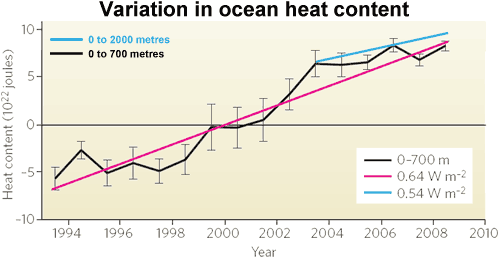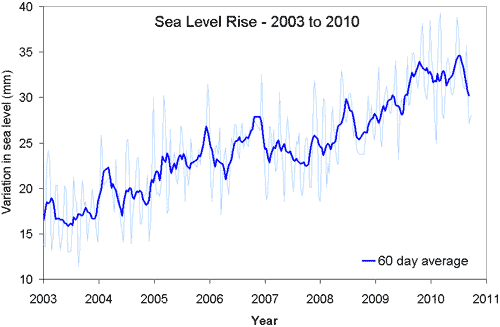 by John Cook, Skeptical Science, January 14, 2011
by John Cook, Skeptical Science, January 14, 2011Christopher Monckton is a prominent and popular global warming skeptic. The Republican Party has on numerous occasions invited him to testify to Congress or the Senate. He is flown all over the globe to speak at public engagements. The Watts Up With That (WUWT) website often grant him a soap box -- one example being an exhortation to WUWT readers to pressure John Abraham's college after Abraham critiqued a Monckton presentation. And last week, WUWT republished in full a long article by Monckton responding to a Mike Steketee article in The Australian. The glowing response from WUWT readers is perhaps best summed up by the very first comment: "The Lord has done well, he’s a hero in my books."
Monckton's response to Steketee's article is a clear example of the rhetorical techniques employed by climate skeptics to paint a misleading picture of climate science. As the article covers many points, we'll take a close look at Monckton's disinformation through a series of detailed blog posts, examining the science discussed and exposing the techniques Monckton uses. We'll start with his first point:
Monckton's response to Steketee's article is a clear example of the rhetorical techniques employed by climate skeptics to paint a misleading picture of climate science. As the article covers many points, we'll take a close look at Monckton's disinformation through a series of detailed blog posts, examining the science discussed and exposing the techniques Monckton uses. We'll start with his first point:
"A recent paper by Professors David Douglass and Robert Knox of Rochester University, New York, has established that – contrary to various climate-extremist assertions – there has been no net accumulation of “missing energy” in the form of heat in the oceans worldwide in the six years since ocean heat content was first reliably measured by the 3000 automated ARGO bathythermographs in 2003. This finding implies that the amount of warming we can expect from even quite a large increase in CO2 concentration is far less than the IPCC and other climate-extremist groups maintain."
Firstly, Monckton incorrectly describes ARGO as bathythermographs while they're actually profiling floats. But that's nitpicking -- his key assertion is that the oceans are not accumulating heat, based on the paper "Recent energy balance of Earth" (Knox & Douglass 2010). This paper considers several estimates of upper ocean heat and finds a slight cooling trend in several of the estimates (they also include one estimate that finds a significant warming trend, more on this later). However, this analysis fails to include a number of other reconstructions of ocean heat.
In an effort to create the most reliable measure of ocean heat, various teams across the world combined their efforts into a single "best estimate" of ocean heat (Lyman 2010). What they found was robust warming in the upper ocean over the 16 years from 1993 to 2008. While the warming trend of the upper ocean from 2003 to 2008 is not as great as the long-term trend, the best estimate indicates the upper ocean is still accumulating heat over this period.

Figure 1. Ocean heat content anomaly from various teams. Ocean heat is calculated from 0 to 700 metres (Lyman 2010).
However, Knox and Douglass only select estimates with a cooling trend, with one interesting exception. They mention one analysis of ocean heat content down to 2000 metres (von Schuckmann 2009) which finds significant ocean warming across the top 2000 metres of the ocean from 2003 to 2008.

Figure 2. Global ocean heat storage (0–2000 metres), measured in 108 Joules per square metre (von Schuckmann 2009).
To put this into perspective, in Figure 3 below, the "best estimate" of upper ocean heat (0–700 metres) from Lyman (2010) is compared to the estimate of deeper ocean heat (0–2000 metres) from von Schuckmann (2009). The black line is upper ocean heat and shows a slight warming trend from 2003 to 2008. The blue line is ocean heat down to 2000 metres, showing greater warming than the upper ocean. This suggests heat is penetrating down below 700 metres. To state that the ocean is not accumulating heat (or worse, that the ocean is cooling), Knox and Douglass, as well as Monckton, fail to take into account all the evidence.

Figure 3. Changing heat content of the global ocean, with respect to the mean of 1993 to 2008 (Trenberth 2010). This analysis samples the ocean to 700 m depth and gives an average warming trend of 0.64 W m−2 (pink line). The data available from Argo floats since 2003 enable an estimate to 2,000 m depth (blue line).
Of course, this is not the final word on ocean heat. Another analysis (Purkey & Johnson 2010) reconstructs ocean heat warming down to abyssal depths and finds significant amounts of heat building up even at the bottom of the ocean. [just in case you readers were about to miss this]

Figure 4. Rate of ocean warming. Areas of warming are shaded in red and regions of cooling are shaded in blue with intensity scaled by the magnitude of the warming. The basins from south to north are the Southeast Pacific Basin, Chile Basin, Peru Basin, and Pacific Basin (Purkey & Johnson 2010).
There are several other indicators of building ocean heat. Satellites observing incoming and outgoing radiation are able to measure changes in the planet's energy imbalance from year to year. What they find is the planet's energy imbalance continues to increase (Trenberth & Fasullo 2010).
Sea level is also driven in large part by changes in ocean heat. As the ocean warms, thermal expansion leads to sea level rise. The other contributor to sea level rise is melting ice sheets and glaciers so sea level rise in general is a good measure of global warming. Over the period of Monckton's alleged "no accumulation of ocean heat," sea levels have continued to rise.

Figure 5. Global sea level rise, inverse barometer applied, seasonal signal removed (University of Colorado at Boulder).
To properly understand what's happening with ocean warming, you need to consider all the evidence -- measurements of the upper ocean, deeper ocean heat, abyssal ocean warming, sea level rise and satellite measurements of energy imbalance. Imagine a table covered with all this evidence. What Monckton does is rummage through this evidence, extract the one piece that seems to back his "no warming" position, sweep the rest of the evidence off the table and unequivocally exclaim "there is no net accumulation of heat in the oceans." This is not skepticism. This is ignoring the full body of evidence.







No comments:
Post a Comment